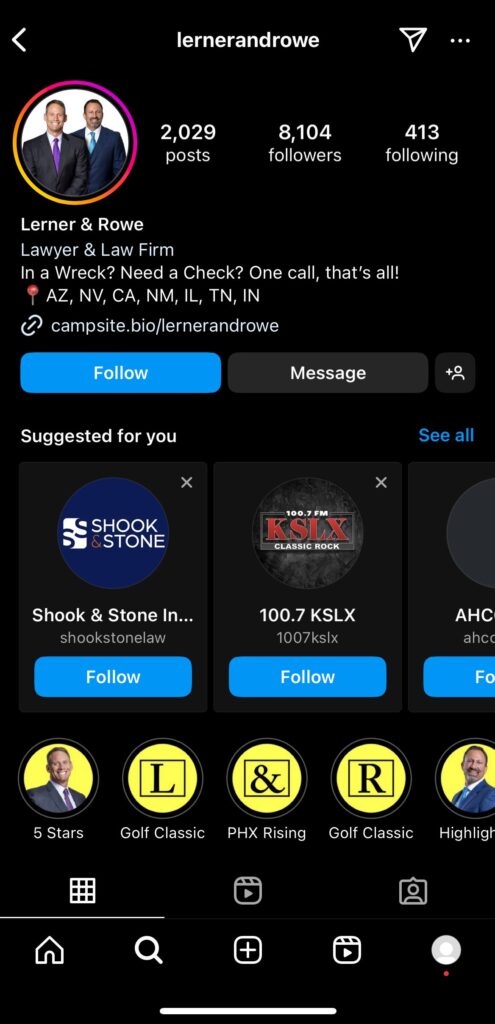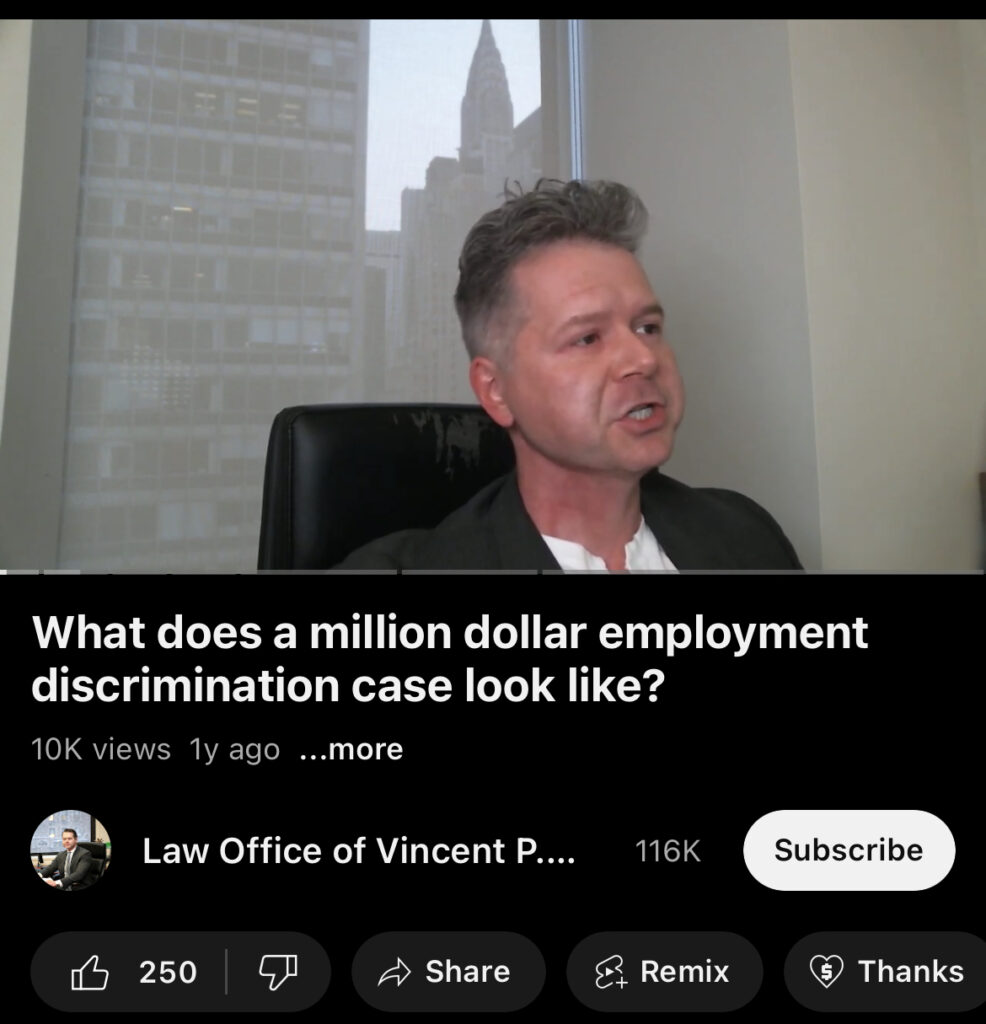Tick-tock, tick-tock. It’s well past time for you to consider your firm’s presence on social platforms like Facebook, Instagram, and, yes, even TikTok. Look, we’re not saying you need to perform the Griddy on a livestream to win over your next client—but if you can break down employment law while doing it, more power to you. It’s high time to recognize that social media is more than just viral dances and silly trends (though that’s definitely part of it) and to think about how you want to show up on these platforms. We’ve created a brief social media platform comparison guide to help you decide where to focus your energies. Whether or not you’re a fan, your clients are spending a lot of time on these apps—so the real question is, how will you meet them where they are?

Chicago-based criminal offense attorney Cierra N. Norris has been making viral TikTok videos since 2023.

Why? The Case for Firms Going Social
Yeah, yeah–social media posting might not seem like the most lawyerly way to spend your time, but allow us to state our case. As of 2023, 71% of lawyers say they receive leads from social media marketing. That stat doesn’t specify the volume of leads or even whether or not those leads are qualified, but it underscores the fact that legal clients are on these platforms. That number also doesn’t dig into whether those leads come from organic posts or social advertising, but it’s safe to assume that the best approach is a combination of paid and organic posts.
In 2024, social media isn’t just for sharing cute puppy videos or discussing the latest celebrity stories to death–social media is ground zero for cultural conversations, local news, reviews, reputations, and even the everyday inquiries that used to belong solely to Google. A strong presence on these platforms can do wonders for your firm’s visibility and credibility.
Social Search and SEO
Gone are the days of Google domination, but don’t mistake that for irrelevancy–it’s still a search giant, and Google-centered SEO is alive and well. But our ever-evolving digital technology is quickly changing how we search for and find information online. In 2023, Google introduced an AI function to SERPs that summarizes information and attempts to provide an on-page answer to the user’s query. This Search Generative Experience (SGE) is just one of many major changes to organic search in recent years, and data shows it’s helped push users to seek alternative avenues to answers.
According to Forbes, 24% of all consumers use social media to search. The number is even higher for Gen Z, with 46% of the demographic using social media as their primary search engine to find information. Given those stats, we can only expect the trend to progress in this direction. Meta recently rolled out a new AI search function on Instagram–the jury’s out on how helpful this function actually is to users, but it underscores the importance of social search. We anticipate that other platforms will follow suit and further refine their search functionalities too.
Furthermore, steady social traffic and engagement levels don’t just elevate your accounts–this feeds back into your overall SEO, helping boost your firm’s presence in traditional search engines too. The stronger your social game, the more you stand to gain in all worlds of search. Check out our internal case study insights, which demonstrate how social ads can boost your Google rankings.
Reviews, Branding, Reputation
Gather round, folks! Public discourse is afoot! Social media has become the unofficial town square for reviews, recommendations, and general information-sharing–and your firm is up for discussion. A BrightLocal survey from the spring of 2024 found that 34% of users visit Instagram and 23% TikTok as part of their preliminary review research online. While some platforms like Facebook offer a more formal rating system, it’s the comment sections, tags, and mentions that really shape how people perceive your firm or legal services. And clients aren’t just visiting your social pages to interact with you–users across industries like connecting with others who’ve had similar experiences, and your public accounts play host to those conversations.
Meta, X, and LinkedIn aren’t just branding showcases–they’re active spaces where feedback is shared, and trust is built or lost. Every comment, tag, or mention has the potential to shape how clients view your firm.
Competition and Visibility
According to the 2022 ABA Legal Technology Survey Report, 89% of respondents indicate that their firms maintain a presence on social media. So, while you’re considering whether to dive into social media, just know that your competition already has. Law firms across the country engage these platforms to build communities, not just audiences. How? Simple stuff–posting updates, replying to comments, buying social ads, and staying present. If the goal is to win clients, you too need to play the social game.
Social Showdown: A 2024 Platform Comparison for Attorneys
Where should we start—MySpace? JK. Sorry, Tom! And RIP to MySpace and all our other digital forebearers. Social media has come a long way at lightning speed, but its evolution has slowed—sort of. Meta (in the forms of Facebook and Instagram) has solidified its place as a tech giant, clearly here to stay. TikTok, on the other hand, represents the new guard–its place among these others seems precarious (legally), but for now it represents a major growth opportunity. So, what’s worth your time? Let’s compare the best social media platforms for law firms in 2024.
Facebook runs on comments and shares. Your posts will either have intent for community engagement–updates, questions, comments, solicitation of input, replying–or they will be super shareable. Facebook offers one of the most robust paid ad programs out of all social platforms with relatively good reporting–organic is hit or miss, but intention with paid ads can give you a leg up locally.
- Demographics
- Broader and slightly older audience (Millennials and Gen X…so, older than TikTok, but not necessarily old).
- Heavy on local daily users with community investment.
- Benefits: Why bother?
- Reach local and regional audiences.
- Join active community groups to stay visible as a legal professional in your area.
- Content Style: What to post?
- Updates, legal news, company milestones.
- Client testimonials or success stories.
- Content that asks for comments, feedback, or shares.
- Ads: Worth it?
- Highly targeted local ads.
- Affordable with strong ROI if done well.
- Cons: The catch
- Organic reach is tough without boosting posts.
- Takes effort to maintain active organic engagement, even with an audience.
Ah, LinkedIn—no one loves LinkedIn, but it’s our dedicated digital networking space. A professional playground the professional where flexing your expertise is actually encouraged. It’s where standout lawyers and formidable firms establish themselves as thought leaders. Build a strong legal brand beyond the court with a little effort on LinkedIn.
- Demographics
- Over 90% of lawyers and law firms (according to the ABA).
- Professionals, industry insiders, potential referral sources.
- Benefits: Why bother?
- Build relationships with peers and create informal referral networks.
- Showcase thought leadership and build your firm’s brand.
- Connect with and learn from industry leaders.
- Content Style: What to post?
- Legal updates, court wins, industry trends.
- Blog posts, guides, and firm news.
- Questions and polls to engage your professional network.
- Ads: Worth it?
- Paid ads? Not really.
- A pro account might be worth it for business development or networking.
- Cons: The catch
- Lower engagement rates compared to most other platforms.
YouTube
Though cat videos are forever, YouTube is so much more than DIYs and LOLs. With over 2.6 billion monthly users, it’s a video content powerhouse that recently embraced more of an educational and informational identity. Whether it’s deep dives into legal concepts or quick tips related to your practice areas, YouTube videos can help you connect with a wider audience.
- Demographics
- Younger audience (Millennials, Gen Z).
- Professionals, business owners and entrepreneurs, knowledge seekers, and everyday folk–video made up 82% of all internet traffic in 2022, so it’s kind of everyone.
- Benefits: Why bother?
- Boost SEO with keyword-rich descriptions and transcripts.
- Create videos to share not just on Youtube but across your site, other social channels (as clips), and email.
- Build thought leadership, show a little personality, and put a face to your firm’s name.
- Content Style: What to post?
- Long-form educational content, explainer videos.
- Series on legal topics, rights, and regulations.
- Behind-the-scenes footage, firm culture or attorney spotlights.
- Ads: Worth it?
- Paid ads? Maybe. High conversion potential depending on your audience.
- Viral content isn’t a must, but engaging videos can still drive leads.
- Cons: The catch
- High effort, lower immediate payoff.
- Requires consistency and some basic video production knowledge.
Instagram. Insta. IG. The ‘gram. It goes by many names, but only because it’s consistently the talk of the town. It’s the fourth largest social media platform globally, trailing only Facebook (ubiquitous), Youtube (long-established), and Whatsapp (is this a social platform a chat channel?). Insta has evolved from the platform for #selfies to a major hub for professional branding. Insta’s visual-first nature makes it perfectly suited for sharing legal news and information in a creative and engaging way. We went from asking is it okay for professionals to have a public account? to why don’t you have a public account?
- Demographics
- Younger audience but increasingly diverse.
- Clients relevant to personal injury, family law, real estate, and immigration firms.
- Benefits: Why bother?
- Humanize your firm and showcase your attorneys’ personalities in a less formal context than the website.
- Build thought leadership in a visual, engaging way.
- Content Style: What to post?
- Infographics for your areas of expertise and client success stories.
- Reels (can cross-post from TikTok, as well), video clips from your YouTube content, and behind-the-scenes content.
- Celebrate milestones and court victories.
- Ads: Worth it?
- Yes—cross-post with Facebook for seamless campaigns.
- Strong local targeting with great reporting through Meta’s tools.
- Cons: The catch
- Requires consistent effort, intentional planning, and timeliness.
- Heavy pivot to video content requires more effort in content creation.
TikTok
No, it is not foreign spyware. At least not that we know of. Innocent until proven guilty, right? For all its controversy, TikTok has become a major player in the world of social media marketing, especially for younger audiences (though data suggests the user base demographics are broadening). Offering short-form (and recently mid-length) video content, TT is a fresh and unique opportunity for law firms to educate, engage, and even entertain. If you want to break out of the mold or tap into a new, younger client base, start recording.
- Demographics
- Younger, tech-savvy crowd (Gen Z and Millennials).
- Audiences for individual plaintiff defense and consumer-focused practices.
- Benefits: Why bother?
- Stretch your firm’s creative talents to show why you stand out above the rest.
- Show your staff and attorneys’ personalities with quick, engaging content.
- Create easy viral moments or educational snippets in just seconds with in-app editing and instant uploads.
- Content Style: What to post?
- Legal tips and advice in quick, digestible videos.
- Behind-the-scenes at your firm or day-in-the-life content.
- Introduce recent graduates, new attorneys or law clerks, etc.
- Trending audio paired with educational facts, entertaining stories, or even staff dance challenges.
- Ads: Worth it?
- Maybe–depends on who your clients are and what kind of audience you can build on the app.
- Potential for viral reach with minimal investment.
- Cons: The catch
- High turnover of trends means you need to stay on top of what’s popular.
- Requires regular video creation and often research to stand out.
The Verdict: Our Recommendations for Law Firms
When it comes to social media marketing for law firms, Facebook and Instagram are the undeniable heavy hitters. No matter your business model, you should be present on these apps. If you’re considering paid ads, FB and IG should be your go-to due to both their location targeting and Meta’s robust advertising support. Plus, they’ve got the most daily users–users who are active. They want to engage, comment, like, share, and message.
LinkedIn might not generate the same buzz for official firm profiles, but individual attorneys can absolutely shine there. Develop a voice and become an authority by sharing thought leadership, engaging with others’ posts and ideas, and building meaningful connections within your industry.
While YouTube and TikTok may feel like beasts due to the video production commitment, the potential payoff of good video content makes them worth considering—especially for firms with the creative verve and time to invest.
Best Platforms for Different Practice Areas:
- Family law → Facebook, Instagram
- Corporate law → LinkedIn, YouTube
- Personal injury → Instagram, Facebook
Content Strategy Tips:
- Post consistently: your community doesn’t deserve to be ghosted.
- Make your content valuable on sight: legal tips, news, common questions answered, and personal stories.
- Stay ethical, honest, and personal in your communications.
So, while we love silly dances, viral memes, and cute cat content, we know social media is so much more than that. These platforms truly represent community–the internet is no longer a place we “go,” it’s a constant in our day-to-day lives–a gentle hum in the background, but a dominating force when we turn our attention fully to it.
Your clients are already there! They’re on these platforms–scrolling, searching, and chatting—so you should be, too. The specific strategies your firm engages will be dependent on factors specific to your practice–clients, law type, brand personality, etc. Whatever your game plan, remember: consistency and authenticity are your best players. And hey, even Tom Brady wouldn’t win a Super Bowl without his offensive line—don’t sit this one out.
Need help tuning into and tuning up your social media marketing? We have ideas.

Hannah Bollman is Nifty’s talented and dynamic Content & Brand Manager. She develops compelling content across blogs, newsletters, social media, and ad campaigns, ensuring alignment with Nifty’s voice and mission. With a background in SEO, content marketing, and stand-up, Hannah brings a unique mix of creativity, strategy, and humor to everything she does. When she’s not shaping Nifty’s brand or growing visibility for legal clients, she’s on a run, on her bike, or enjoying a delicious falafel sammich.







